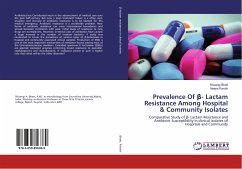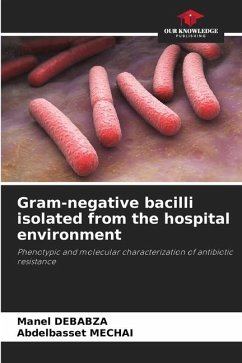
Prevalence Of ¿- Lactam Resistance Among Hospital & Community Isolates
Comparative Study of ¿- Lactam Resistance and Antibiotic Susceptibility in clinical isolates of Hospitals and Community
Versandkostenfrei!
Versandfertig in 6-10 Tagen
58,99 €
inkl. MwSt.

PAYBACK Punkte
29 °P sammeln!
Antibiotics has Contributed much in the advancement of medical care over the past half-century. But now a day's treatment failure is a often seen situation and increase of antibiotic resistance is to be blamed for this medical emergency. Antibiotic resistance is a worldwide problem. New forms of antibiotic resistance can cross international boundaries and spread between continents with ease. Initial levels of resistance to new drugs are normally less. However, irrational uses of antibiotics have caused a huge increase in the number of resistant bacteria. A study was conducted to know the preva...
Antibiotics has Contributed much in the advancement of medical care over the past half-century. But now a day's treatment failure is a often seen situation and increase of antibiotic resistance is to be blamed for this medical emergency. Antibiotic resistance is a worldwide problem. New forms of antibiotic resistance can cross international boundaries and spread between continents with ease. Initial levels of resistance to new drugs are normally less. However, irrational uses of antibiotics have caused a huge increase in the number of resistant bacteria. A study was conducted to know the prevalence of various types of beta-lactamases in hospital and community associated clinical samples. Production of ESBL is one of the most important mechanisms of resistance found among most of the Enterobacteriaceae members. Extended spectrum ß -lactamase (ESBLs) are plasmid mediated enzymes conferring broad resistance to penicillin, cephalosporins and monobactams. If resistance persist at sucha higher rate than what will be the other alternate?












